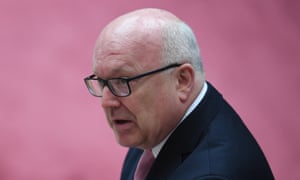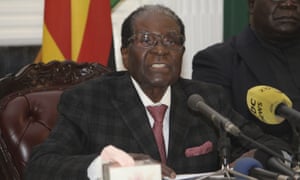The attorney general, George Brandis, has said he will move a new amendment to allow civil celebrants to reject same-sex weddings as the Coalition gears up for a legislative fight about extending religious protections beyond the cross-party bill.
After the Australian Bureau of Statistics announced that 61.6% of people had voted in favour of same-sex marriage, the prime minister, Malcolm Turnbull, warned that because of the “overwhelming” result, parliament must now deliver marriage equality – and he expected it to be law by Christmas.
Marriage equality advocates won the first round of an impending legislative fight, after Senator James Paterson withdrew his rival conservative bill on Wednesday afternoon.
The starting point for debate will now be the cross-party bill authored by the Liberal senator Dean Smith and supported by Labor, the Greens and others. The bill makes minimalist changes to protect religious freedom without legalising discrimination by commercial service providers.
Smith and the cross-party group capitalised on the mandate in the survey by introducing the bill and passing an hours motion that will lead to the bill being debated until it is passed in the sitting week beginning 27 November.
Brandis told the Senate that parliamentarians would “have their own views” about protections of religious freedom and conscience.
“I myself would prefer to see them go further, so I foreshadow that in the committee stage of the debate I will move an amendment to extend the right of conscientious objection to performing a ceremony of marriage from ministers of religion to include civil celebrants as well,” he said.
Brandis said this was not a government position but his private view. He also called for a provision to state that “nothing in the bill makes it unlawful for people to hold and to express the views of their own religion on marriage”.
In their contributions, the Labor leader in the Senate, Penny Wong, and the Greens leader, Richard Di Natale, warned that Australians had voted to “remove discrimination” from marriage law, not to add to it, signalling they are inclined to reject extending the right to conscientious objection to civil celebrants.
In a statement before the motion, Paterson said he would seek “the strongest possible protections for the freedoms of all Australians” through amendments.
Others to signal support for amendments include the finance minister, Mathias Cormann, and the former prime minister Tony Abbott.
Standing alongside Turnbull at the press conference after the survey announcement, Cormann said he agreed the Smith bill was “a good starting point” but warned that it needed “additional religious protections”.
“I believe that the Smith bill will need some improvements,” he said. “Personally, I believe that the Paterson bill goes somewhat too far.
“I would like to think that the parliament will be able to meet somewhere in between to give effect to the decision of the Australian people … and to also ensure that we accommodate the legitimate concern of many Australians for there to be appropriate levels of religious protections.”
In a statement, Abbott said “the parliament should respect the result” but he pointedly noted that both the prime minister and the opposition leader, Bill Shorten, had “pledged their support for freedom of religion”.
“I look forward to a parliamentary process that improves on the Dean Smith bill to implement same-sex marriage with freedom of conscience for all, not just the churches,” he said.
Labor’s caucus has already passed a motion supporting the Smith bill as an acceptable balance between marriage equality and religious freedom.
Earlier, at a rally in Melbourne, Shorten promised: “Today we celebrate, tomorrow we legislate.”
Throughout the day several Liberals who voted against same-sex marriage in the survey said they would vote in favour of it in parliament, including the assistant minister for cities, Angus Taylor, and the Liberal MP Lucy Wicks.
But the Liberal senator David Fawcett, who chaired the Senate committee inquiry into same-sex marriage from which Smith’s bill was drafted, told Guardian Australia the inquiry had concluded that religious freedom needed to be positively protected.
At a press conference Smith suggested a way through could be for an existing parliamentary inquiry into freedom of religion to report after same-sex marriage was legalised, because conservatives are raising issues of parenting laws and free speech that are not relevant to a marriage bill.
Senator Matt Canavan told ABC News24 that he would respect the wishes of Queensland and would not oppose a same-sex marriage bill, but added he “won’t support a bill that diminishes fundamental human rights”, arguing that the Smith bill was not “adequate”.
The Liberal National MP George Christensen said he would vote for a bill with protections inserted but would otherwise abstain, saying it “keeps faith with my commitment ... [to] not vote against the wishes of my electorate”.
After a high no vote in western Sydney, the Labor MPs Jason Clare, Linda Burney, Tony Burke, Michelle Rowland and Ed Husic confirmed they would vote in favour of marriage equality, despite majorities against it in their electorates.
Hinch said Paterson had acted as a “stalking horse” for conservative opponents of same-sex marriage and suggested amendments put up one by one would be “slaughtered”.
One Nation, which controls three votes in the Senate, has reserved its position.
















 powered by plista
powered by plista